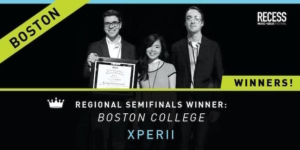STARTING A COMPANY WITH LITTLE BUSINESS EXPERIENCE
 Ehrenberg is only 22 years old. He skipped six grades and began his college education at 11. By age 16, he was MIT’s youngest neuroscience graduate student ever. Chen is even younger, at 21, and studies computer science, math, and economics. She’s developed software that’s used in bioinformatics, theoretical mathematics, and computer vision labs across the country.
Ehrenberg is only 22 years old. He skipped six grades and began his college education at 11. By age 16, he was MIT’s youngest neuroscience graduate student ever. Chen is even younger, at 21, and studies computer science, math, and economics. She’s developed software that’s used in bioinformatics, theoretical mathematics, and computer vision labs across the country.
They are accomplished young scholars. But getting started in business wasn’t easy. Neither had started a company before.
“It was definitely a learning process. When you’re running a start-up, you have to know everything about every single department,” Ehrenberg says. “My co-founder and I had to learn HIPAA compliance and become experts in medical data security, web and mobile applications, sales, marketing, and hiring. You have to learn it all.”
By the time Ehrenberg and Chen heard about RECESS, they were pretty far along. They had raised about $70,000 in capital and made a few hires. “We knew almost nothing about (RECESS),” Ehrenberg says. “But whenever there’s an opportunity, you apply and you hope you get in.”
He says it was their first time in a national competition, and they learned a lot from all the different judges. “We got great advice every step of the way,” he says.
Xperii is in the second half of a beta launch right now, and Ehrenberg says they expect to fully launch in the fall.
WINNERS GET BRAGGING RIGHTS, BUT EVERYONE LEARNS SOMETHING
Thevenow says he thinks every contestant at RECESS gains something from the experience. Twenty-five judges participated in the final alone, and he said there are tons of mentors for the students throughout the competition. They also hold bootcamp-type classes in which experts teach participants how to pitch, how to brand their companies, and how to prepare for investor meetings. “The most valuable thing is increasing their contacts,” he says. “The team that wins gets the most bragging rights, but everyone is there to help each other and learn from each other.”
But winning is pretty great. Ehrenberg says it helps his young company raise capital with investors. And it helped him learn that communication is key. First off, students interested in doing a start-up should talk to target customers to see what people want, he says. There are lots of cool ideas, but in the end you need a product you can sell. Once you have the idea, it’s important to have a good pitch.
“Make sure you can explain your pitch to your grandma,” Ehrenburg says. “And practice on everyone. Practice until you really have it down.”











Questions about this article? Email us or leave a comment below.